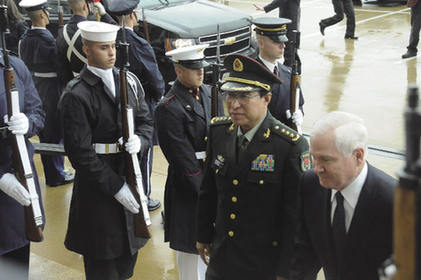| Through the Glass Brightly: Increasing Military Transparency
ON August 20, 2009, with the approval of the Central Military Commission, www.mod.gov.cn, the website of the Ministry of National Defense, was put into trial operation at 0:00 hours. The total number of hits in the first three months reached 1.25 billion.
In the past, transparency on the activities of China's armed forces was not high. The aim of launching the new website for the Ministry of National Defense is to increase public understanding of national defense aims and the activities of the armed forces, to promote understanding of China's national defense policy by the peoples of the world, to respond to the questions and concerns expressed by the general public domestically and internationally, and to enhance mutual trust among the armed forces of various nations.
Through www.mod.gov.cn the Ministry of National Defense and the four general departments of the People's Liberation Army (PLA) have established an information transmission system. It refreshes its contents directly from various corps and even frontline troops of the PLA. Important documents, such as the White Paper on National Defense, are published on the website in the most timely fashion possible.
 |
|
U.S. Secretary of Defense Robert Gates welcomes Xu Caihou, vice-chairman of China’s Central Military Commission, to the Pentagon in October 2009. Cnsphoto |
Establishment of Official Information Release System
China introduced the system of spokesperson 27 years ago in 1982, with the appointment of Qian Qichen as spokesman for the Ministry of Foreign Affairs. In nearly three decades, traditional political culture, accustomed to operating under the "Silence is golden" rule, has been changing gradually, and government officials have become more outspoken and eloquent. Gradually they have been honing their oratory skills and are more at ease speaking before the public media to clarify the various positions of the government on the issues of the day.
On April 23, 1983, the Chinese government announced the formal establishment of the spokesperson system. However, over the next 20 years the Ministry of Foreign Affairs was the only de facto government department filling such a post. It was not until the occurrence of the SARS crisis in 2003 that prompted a new era of Chinese government information transparency. In that year, a three-level press release system was institutionalized: the State Council Information Office, various ministries and commissions of the State Council, and provincial-level governments.
In May 2008, the Provisions on Government Information Disclosure took effect. How the wheels of government power turn has become more transparent, and the general public's right to information has been respected and accommodated by the government. In the same year, the State Council Information Office, various ministries and commissions of the central government and provincial-level governments held a total of 1,587 press conferences, greatly surpassing the number organized in past years.
During the 2009 sessions of the National People's Congress (NPC) and the Chinese People's Political Consultative Conference (CPPCC), Former Foreign Minister Li Zhaoxing and Former Minister of the State Council Information Office Zhao Qizheng served as spokespersons of NPC and CPPCC, respectively. For the convenience of journalists, the press centers of NPC and CPPCC established websites, to issue information on news coverage and other related information via the Internet. The NPC and CPPCC took their first steps in information disclosure.
So far, under coordination of the State Council Information Office, 75 departments under the Central Committee of the Communist Party of China, the State Council and the armed forces have established roles for press spokespersons.
| 